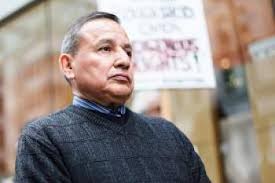Today, many people in British Columbia — and indeed across Canada — are trying to determine just how the BC Liberals won the provincial election and what implications this surprise result will have.
Grand Chief Stewart Phillip of the Union of BC Indian Chiefs (UBCIC) was interviewed today by Jane Bouey on Media Mornings, a daily news and talk program on Vancouver’s Coop Radio 100.5FM. Here is an edited version of their conversation.
Jane Bouey: What’s your reaction to the election results?
Grand Chief Stewart Phillip: Needless to say, we’re greatly disappointed. We were looking forward to a change for the better, so to speak, and clearly that did not materialize. We believe the outcome of the B.C. Election represents the drawing of future battle lines between the environment and resource development.
JB: Yes, one of the fears I have … is this government now feels they have a complete mandate to ignore Indigenous rights and the environment.
SP: Yes, I don’t think there’s any question about that. As I watched the results unfold, I began to realize that we are, in all likelihood, moving toward an era of confrontation and conflict, given the fact that under Premier Clark’s leadership there was no effort to invest in any significant or genuine way in terms of building a closer with the Indigenous peoples of this province. She was quite dismissive and very distant with respect to continuing the work of the so-called ‘new relationship’.
JB: It seems like there was shift, in terms of the policies of the provincial Liberal government from the early years of Campbell over time to Christy Clark’s attitude. What are your thoughts on that?
SP: Well I don’t see any question about that. When Premier Clark assumed the leadership of the BC Liberals she chose to basically cease to invest any time or resources into developing relations between First Nations in B.C. and her government. And I think she will believe that was a proper decision and, with her new mandate, that may deteriorate even further, which again will set the stage for future conflict and confrontation.
I think when one analyzes the results on a riding by riding basis, one notes that there were 12 ridings where the combined NDP and Green vote was larger than the Liberal candidate who won in each one of those ridings. So, in other words, if there had been some strategic agreement between the Greens and the NDP, the NDP would’ve formed government with somewhere in the neighbourhood of 45 seats.
JB: That assumes that those Green votes would have all gone NDP… I wanted to ask you about reports during the election that voters with Indian status cards were being turned away from the polls. Do you have any details on that?
SP: We had heard in our office that there were complaints being filed in Jenny Kwan’s [riding] to that effect. There was a flurry of calls looking into the matter, and I believe that some of the personnel at the polling stations just weren’t aware that status cards were recognized identification, and I believe the matter was rectified.
JB: That’s my understanding as well, but it must have been very frustrating for those voters at the time… What other issues are of major concern for you, with this government?
SP: Again, I think this election and its outcome was all about resource development and ‘growing the economy’, and creating jobs. And, again, that may unfold without any consideration or respect for the environment of other social issues. Certainly, child poverty is a major issue in the province of B.C., and the issue of children and families is another major issue that seems to have taken a backseat to these grandiose notions of economic prosperity through resource development. So it’s very much a gold rush mentality at the expense of human rights and the social needs of the people in the province of B.C. who really find themselves challenged in that regard.
JB: Where do we go from here?
SP: I really want to stress this point: the left needs to have some soul-searching about the how the vote is continuously split. The BC Liberals are obviously the beneficiaries of that split. I think there has to be some serious discussion and there has to be a more strategic approach.
I congratulate Mr. Weaver in Oak Bay – Gordon Head, and I think perhaps the Greens should focus on key ridings where they believe they can elect candidates. But to run candidates in all ridings, that guarantees splitting the vote; I think that has to be re-examined.
For the Indigenous peoples of the province, we will continue to protest pipelines, mines, dams … with respect to its infringement on our Aboriginal title and rights interests and the integrity of the environment within our respective territories. That will not change. And I think there will be a greater urgency to us aligning and allying ourselves with other like-minded groups and organizations to carry those battles forward.
JB: I try to remain hopeful about our ability to do that. How do you feel?
SP: Well I think that there’s a lot of soul-searching going on today… I think that people will very quickly realize that alliances are more important than ever now with respect to our efforts to protect the environmental and social values of this province that have been totally eclipsed by the ‘scratch and win’ economic theory of the BC Liberal government under Christy Clark, and that’s going to set the tone of the next four years.
Media Mornings segments are available on the rabble podcast network. For all our of our B.C. Election coverage, visit our issues page here.
Public Education activst and former Vice Chair of the Vancouver School Board, Jane Bouey is one of the producers and hosts of W2’s Media Mornings.




